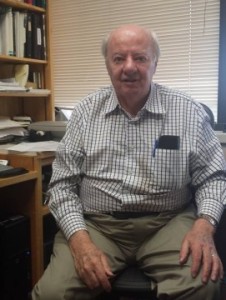 Denver native Joel Bedford knew at an early age that he wanted to spend his time working in some area of science. Excelling at math and science, Bedford took an interest in chemistry and has been able to spend his time studying and researching ever since.
Denver native Joel Bedford knew at an early age that he wanted to spend his time working in some area of science. Excelling at math and science, Bedford took an interest in chemistry and has been able to spend his time studying and researching ever since.
Bedford received his bachelor’s in chemistry from the University of Colorado and then pursued his master’s in Radiology at the CU Medical School in Denver. During his time as a graduate student in Denver, he worked alongside a Fulbright Fellow from Oxford, who then invited him to England to complete his doctoral degree in radiobiology. Bedford completed his studies in 1966 and returned to the United States, accepting a faculty position at Vanderbilt University. Dr. Bedford made the jump to Colorado State University in 1975 and has been a professor in College of Veterinary Medicine and Biomedical Sciences ever since.
Radiation biology and genetics
When Bedford arrived at CSU, he began teaching graduate courses in radiation biology and radiation genetics. At the time, the Radiological Health Sciences department had not yet merged with Environmental Health to form today’s Environmental and Radiological Health Sciences program. The combined department now houses both graduate and undergraduate programs. To date, Bedford has advised around 20 Ph.D. students and has sat on over 50 graduate committees.
Over his 40 years at Colorado State, Bedford has specialized in the study of how radiation affects cells, genes and chromosomes. He has allowed technological developments and advancements in the field of radiation biology to steer his research and grant writing endeavors. In recent years, he has found an interest in the effects of exposure to low-level radiation.
“Day to day, nobody can avoid the background radiation that we have, which is maybe 30 percent higher in some areas here in Colorado than it is at sea level,” Bedford explained. “But there are other sources of radiation like medical exposure and accidental exposure to radioactivity that lead us to question how dangerous it really is and what kind of effects it can have at a cellular and genetic level.”
Bedford has seen CSU, its students and society greatly expand the state of knowledge over the years. He has been successful in securing funding from the National Cancer Institute, NASA and the Department of Energy totaling about $19 million over his career. These grants have afforded him the opportunity to craft his own studies, change with the times, provide funding for graduate students and post-doctoral fellows, and function as a thought leader in cancer-based radiation studies.
Major changes
“One of the major changes is that there’s really been a revolution in molecular biology,” he said. “We’ve been using more and more molecular techniques in our studies and students have been more interested in implementing some of these technologies in the study of genetics. So the ability to do those kind of studies have changed. We can do things now that we could never have dreamed of doing 40 years ago. These changes in technology have really driven a lot of our work.”
With more than 140 publications to his name and four patents granted or pending, Bedford ends a transitional retirement on June 1, 2015. While he will remain involved with some teaching, along with several national societies, boards and committees, he is looking forward to having more time to spend outdoors.
In his time away from work, Bedford enjoys being surrounded by mountains and fresh air. While his favorite fishing spots remain a well-kept secret, he is looking forward to having more time to devote to this hobby, in the heart of the Colorado and Wyoming wilderness. He and his wife, who have three children, have multiple trips planned in the coming months and anticipate many more trips abroad.
We thank Dr. Bedford for his commitment to Colorado State University and wish him well in the next phase of his life.